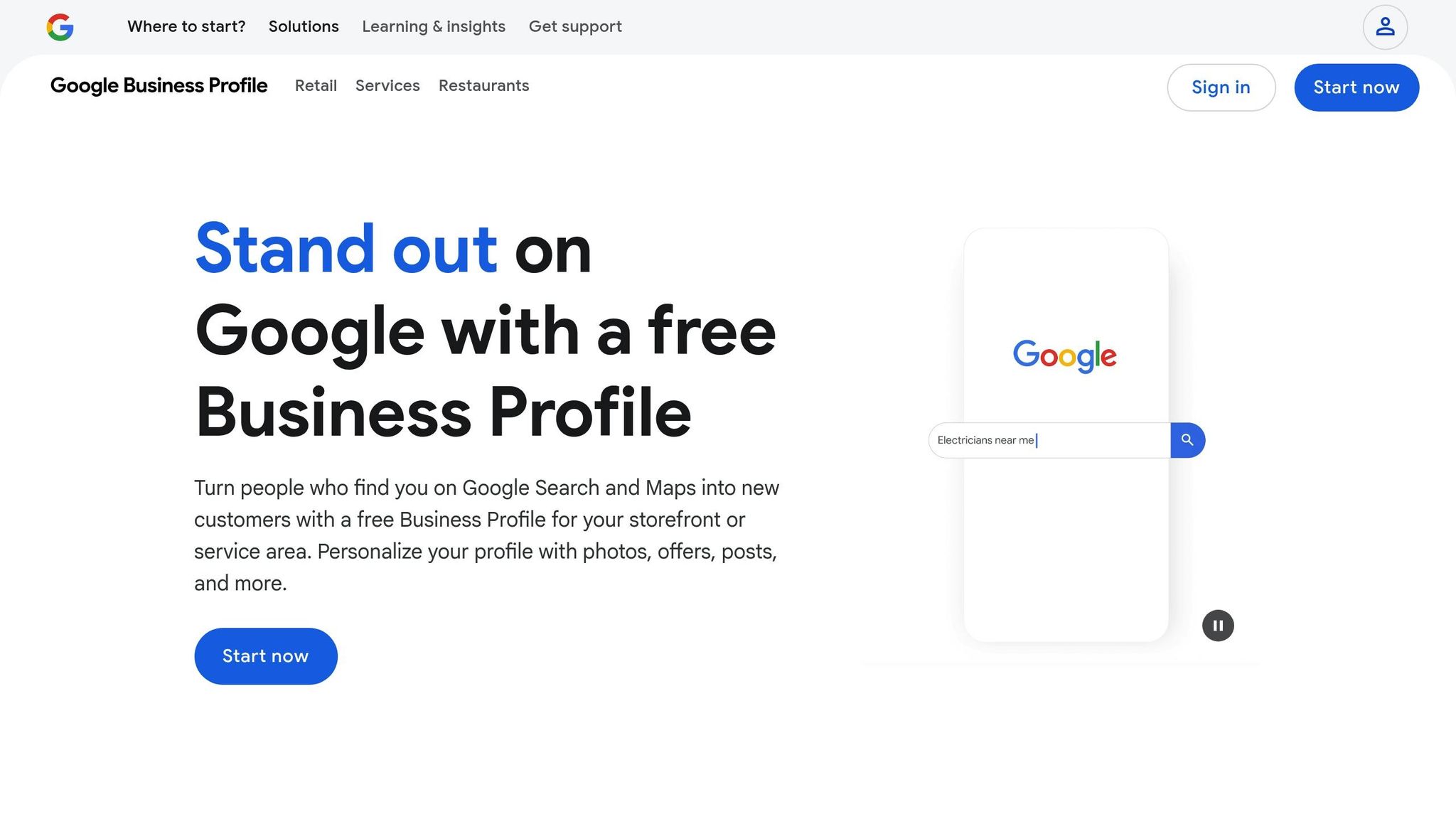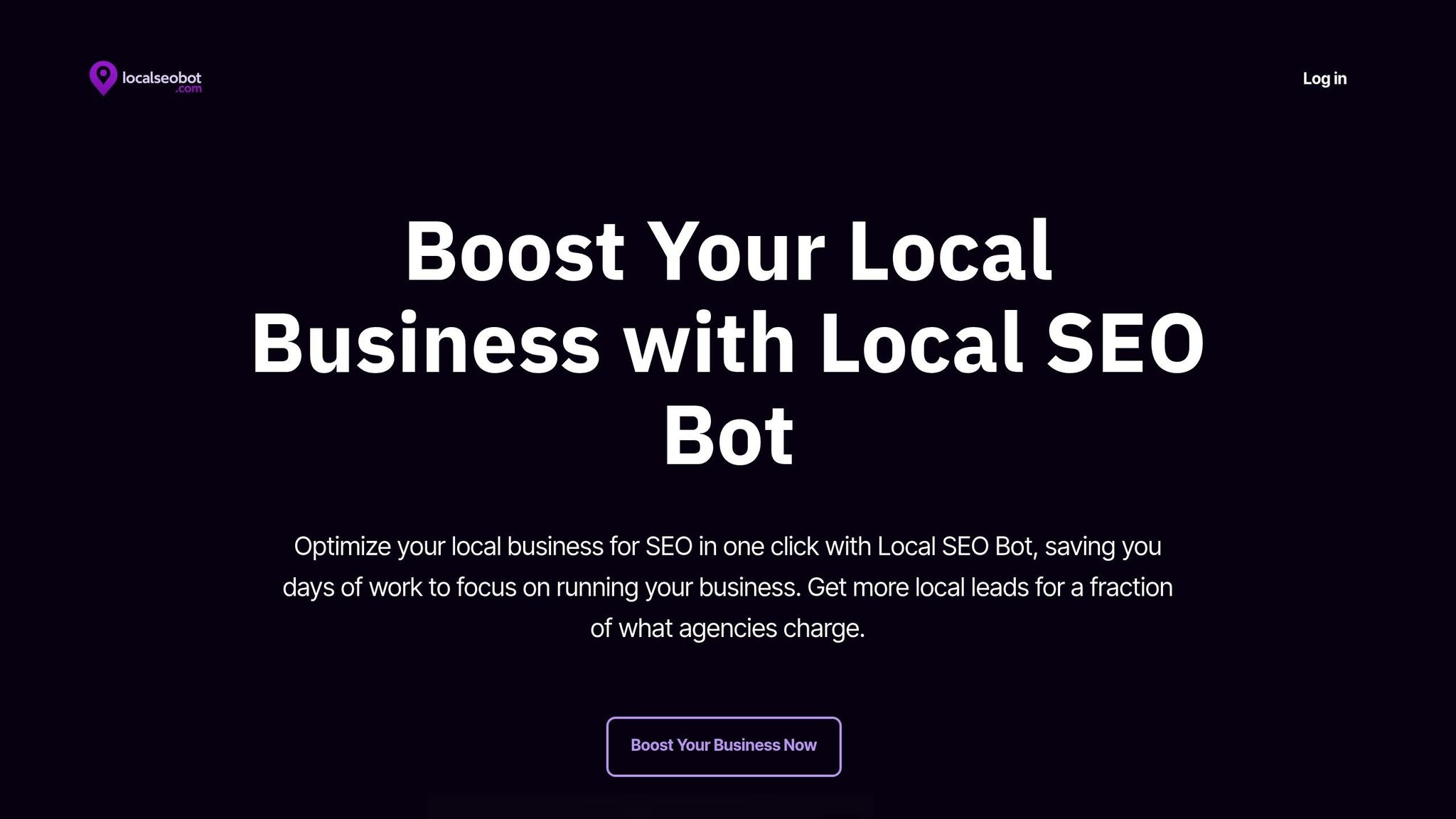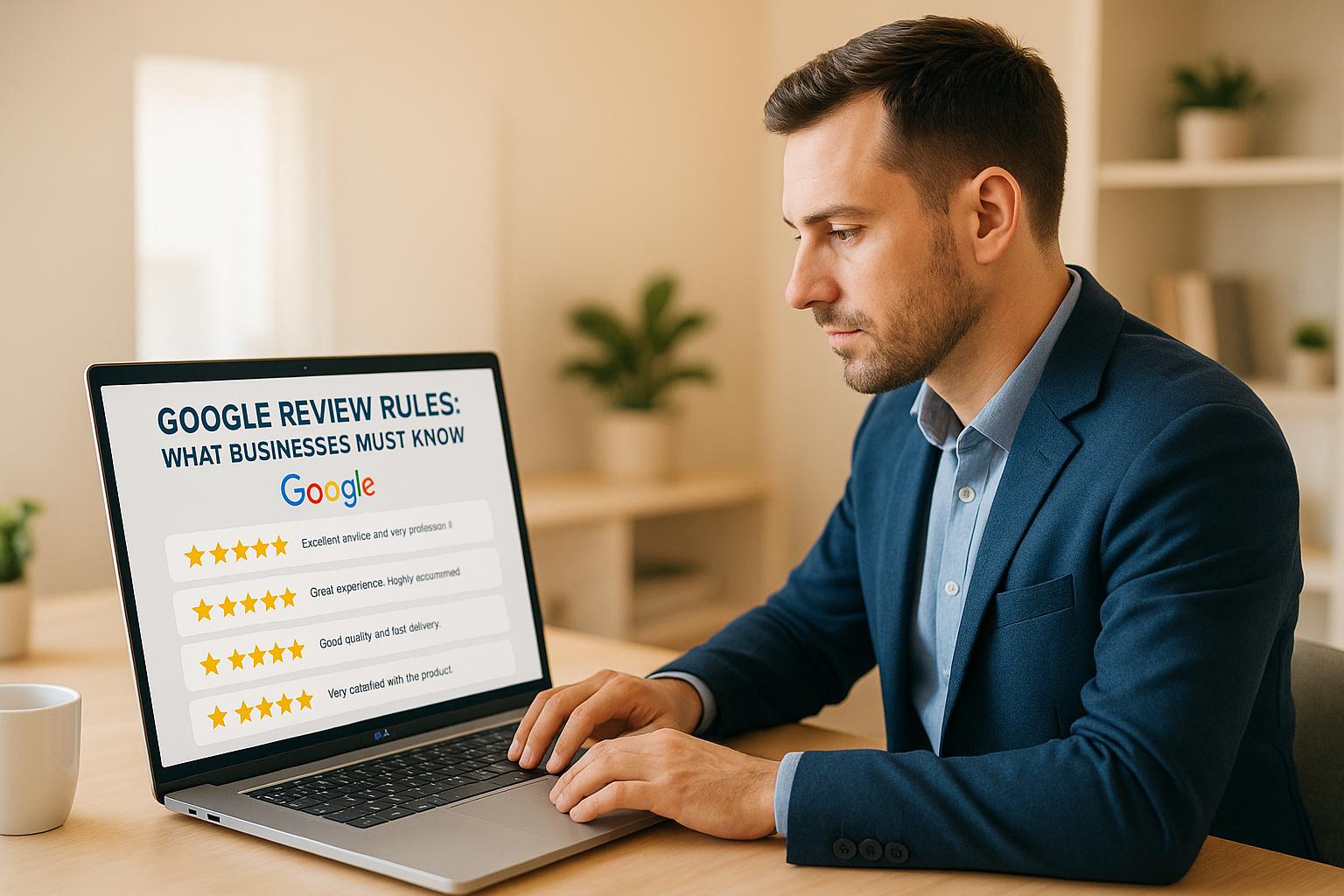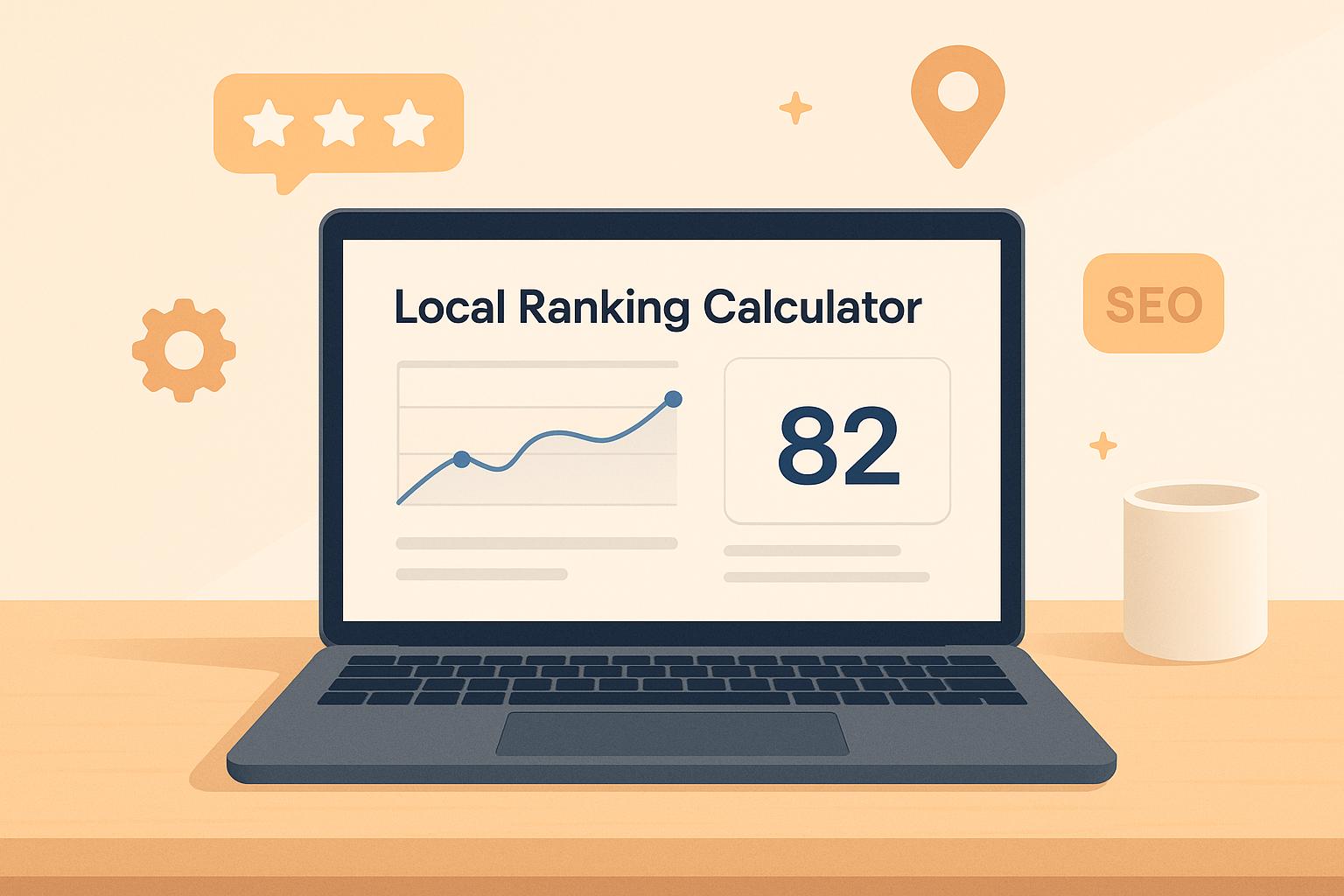Local SEO helps businesses show up in local search results when people look for products or services nearby, like “pizza near me” or “plumber in Denver.” It’s focused on attracting nearby customers by optimizing online presence through tools like Google Business Profiles, consistent business listings (citations), and customer reviews. For small businesses, this means better visibility, more local leads, and a chance to compete with larger companies in their area.
Key Points:
- Google Business Profile: Your online storefront with address, hours, and reviews. Verification is required to appear in local searches.
- Local Citations: Consistent mentions of your business’s name, address, and phone number across the web improve local rankings.
- Customer Reviews: Positive reviews build trust and boost search rankings. Responding to reviews shows engagement.
Local SEO is essential for small businesses because it connects them directly with nearby customers who are ready to buy, turning searches into sales.
Local SEO For Beginners (2025 Complete Guide)
What Is Local SEO and How Does It Work?
Local SEO is all about optimizing your online presence to show up prominently when people search for products or services within a specific area. Think of it as your digital billboard, ensuring that your business gets noticed by the right audience in your local community.
This strategy helps search engines like Google figure out three essential things about your business: where you’re located, what you offer, and why people should trust you. These factors guide search engines in ranking your business when someone nearby is looking for what you sell.
At its core, local SEO relies on three key components working together: your Google Business Profile, local citations, and customer reviews. Let’s dive into each of these elements to see how they contribute to effective local SEO.
Setting Up Google Business Profiles
Your Google Business Profile is like your online storefront on Google Search and Maps. It’s the foundation of your local SEO efforts, showcasing critical details like your address, phone number, business hours, and customer reviews - all directly visible in search results.
To activate your profile, you’ll need to verify your business. This step ensures you have the authority to manage your listing. Google typically sends a postcard with a verification code to your business address. Without verification, your profile won’t show up in local search results or on Google Maps.
Once verified, make your profile stand out by uploading high-quality photos and videos. Include images of your storefront, products, and services to give potential customers a clear idea of what to expect when they visit or call.
Choosing the right business categories is another crucial step. Your primary category should describe your main service or product, while secondary categories can highlight additional offerings. For instance, a bakery might select "Bakery" as the primary category and "Cake Shop" or "Catering Service" as secondary ones.
Creating Local Citations
Local citations are online mentions of your business’s Name, Address, and Phone number (NAP) across various platforms, directories, and websites. These citations help search engines confirm your business’s legitimacy and location.
Consistency is key when it comes to citations. Your NAP details must match exactly across all platforms. For example, if your Google Business Profile lists "456 Elm Road", but another directory says "456 Elm Rd.", search engines might see these as separate entities, which can hurt your rankings.
While citations only account for about 10% of Google’s local ranking factors, in competitive markets, that small percentage can make the difference between landing on the first page or getting lost in the results.
To build citations, focus on listing your business in relevant local directories, industry-specific sites, and general platforms. For example, a roofing company in Los Angeles should prioritize directories that cater to both the Los Angeles area and the roofing industry.
Because accuracy is critical, manually review each citation to ensure everything is correct. If you find outdated or incorrect listings, update or remove them promptly. Inconsistent citations can harm your local SEO efforts instead of helping them.
Once your citations are in good shape, the next step is managing customer reviews.
Handling Customer Reviews
Customer reviews, especially on Google, play a major role in building trust and improving your local search rankings. They provide social proof, showing potential customers that real people have interacted with your business - and that can be a powerful motivator.
Here’s why reviews matter: Businesses with over 100 reviews generate 52% more revenue on average compared to those with fewer than 10. Plus, 76% of consumers trust online reviews as much as personal recommendations, and more than 90% of consumers in a 2023 survey said reviews significantly influence their buying decisions.
Encouraging reviews requires a proactive approach. Ask happy customers to leave a review, whether in person or through follow-up emails. Make it easy by sharing a direct link to your Google Business Profile’s review section.
Responding to reviews is just as important as collecting them. Thank customers for positive feedback and address negative reviews professionally. Quick responses - ideally within 24–48 hours - show that you value customer input and are committed to resolving issues. In some cases, a well-handled negative review can turn a dissatisfied customer into a loyal one.
Why Local SEO Matters for Small Businesses
Local SEO has become a game-changer for small businesses. With more people relying on their smartphones to find nearby products and services, showing up in the right place at the right time can make all the difference. It helps businesses stand out, attract more customers, and stay competitive in their local markets.
Better Online Visibility
Local SEO can help your business climb the search rankings, making it easier for nearby customers to discover you. Think about when someone searches for "plumber near me" or "best pizza in downtown." If your business is optimized for local search, you’re more likely to appear at the top. A polished Google Maps listing - with accurate details, eye-catching photos, and glowing reviews - can also enhance your visibility and attract even more attention.
More Local Leads and Sales
When done right, local SEO connects you directly with customers who are ready to buy. By focusing on your immediate area, you’re targeting people who are actively searching for what you offer. This means more foot traffic to your store, more calls to your business, and ultimately, more sales. It’s a highly effective way to turn online searches into real-world results.
Competing with Larger Companies Locally
Local SEO gives small businesses a chance to shine against larger competitors. While big companies often focus on broad, nationwide campaigns, small businesses can use their deep understanding of the local community to create a more personal and relevant experience. Highlighting factors like proximity, local expertise, and community involvement can help you stand out in search results. Plus, small businesses often have the advantage of being more flexible and quick to adapt to local trends and customer needs, giving them an extra edge in the market.
sbb-itb-0e6533f
How to Start Local SEO for Your Business
If you're ready to dive into local SEO, the good news is that it doesn't have to be overwhelming. By focusing on a few key steps - setting up your Google Business Profile, ensuring accurate local citations, and leveraging automation tools - you can start building a strong local presence.
Set Up Your Google Business Profile

Think of your Google Business Profile as the foundation of your local SEO strategy. To make the most of it, claim and verify your profile, then fill out every field with care. This includes your name, address, and phone number (NAP), precise business categories, operating hours, and eye-catching photos. Don’t forget to write a clear, engaging description that highlights your services and ties them to your location. The more complete and accurate your profile, the better chance you have of showing up in local searches.
Build Accurate Local Citations
Local citations - mentions of your business's NAP on platforms like directories, websites, and social media - play a big role in local SEO. Consistency is key here. Make sure your NAP details are identical across all platforms, and take time to audit these listings regularly to catch any errors. A simple way to stay organized is by keeping a master document with your exact NAP details, which you can refer to whenever you're updating or creating new listings.
Use Local SEO Bot for Automation

Managing local SEO by hand can eat up a lot of time, but tools like Local SEO Bot can make things much easier. With features like one-click citation building, automated review management, and Google Business Profile updates, this platform takes care of repetitive tasks so you can focus on running your business.
One standout feature is its automated review response tool, which monitors reviews across platforms and generates thoughtful replies. This keeps your online presence active without requiring constant attention. Plus, Local SEO Bot offers ranking tracking and local SEO audits, helping you see how your business performs for key search terms and pinpoint areas for improvement.
For small businesses, the Basic plan costs $49/month, making it a practical option to enhance your local SEO efforts without breaking the bank.
How to Track Local SEO Results
Once you've set up your profile and citations, the next step is keeping tabs on your results. Tracking your local SEO performance is essential to fine-tune your strategy and make the most of your efforts.
Jean-François Monfette, a Digital Marketing Specialist at BDC, emphasizes this point: "Unless you're a well-known brand, if you're not on the Google map, you don't exist". For small businesses competing locally, monitoring your performance isn’t optional - it’s a must.
Here’s how to stay on top of your local SEO game.
Check Local Search Rankings
Keeping an eye on your search rankings for location-specific keywords is a great way to measure your progress. Start by auditing your current rankings and focus on keywords that directly connect to your business, such as "plumber near me", "best pizza in [your city]", or "[your service] + [your location]." It’s also helpful to see how your competitors are ranking for these terms. This can highlight areas where you might improve your standing in the local market.
Tools like Local SEO Bot can make this easier by automatically tracking your performance for key terms across multiple locations. This allows you to see where you stand and adjust your strategy as needed.
Review Website Traffic and Leads
Your website analytics can tell you whether your local SEO efforts are driving real business results. Platforms like Google Analytics and Google Search Console offer insights into organic traffic, visitor locations, and conversion rates. Look for increases in actions like phone calls, contact form submissions, or requests for directions - these are strong indicators that your local SEO is working.
You can also set specific goals, such as tracking how many users download a service menu, book an appointment, or call your business. Keep in mind, though, that local SEO takes time - results often take three to six months to become noticeable. Patience and consistent monitoring are key.
Monitor Customer Reviews and Engagement
Customer reviews are another important metric for evaluating your SEO success. Reviews not only improve your search rankings but also help attract new customers. In fact, review signals account for roughly 9% of local pack/finder ranking factors. Businesses in the top Google local pack positions tend to have an average of 404 reviews, compared to 281 for those ranked lower. Additionally, businesses with an average Google Business Profile rating of 4.1 or higher are more likely to see better conversions. Responding to reviews also matters - a 4.1% increase in conversion rates occurs for every 25% of reviews a business responds to.
To stay on top of this, track metrics like the total number of reviews, average rating, review frequency, and response rates. Tools like Local SEO Bot can help by automating review monitoring and even generating responses. This ensures you’re engaging with customers and maintaining an active online presence without needing to manually check every platform.
Conclusion: Why Local SEO Matters for Small Businesses
Local SEO has the power to transform small businesses by increasing visibility in their immediate area and drawing in nearby customers. As we've explored, steps like optimizing your Google Business Profile, ensuring consistent local citations, and managing customer reviews all play a big role in strengthening your online presence.
When done right, local SEO not only improves your rankings but also drives more traffic and brings in highly relevant local leads.
For small business owners with packed schedules, tools that simplify the process can make a huge difference. Automation can handle the technical side of SEO quickly and effectively, saving you time and delivering clear results. For instance, Local SEO Bot offers features like one-click optimization and automated review management, making it easier and more affordable to boost your local visibility.
FAQs
How can small businesses encourage and manage customer reviews to boost their local SEO?
Small businesses can strengthen their local SEO by encouraging happy customers to share their experiences through reviews. A friendly, polite request - whether face-to-face, in an email, or through a follow-up message - can go a long way in gathering feedback. Taking the time to respond to reviews, whether they're glowing or critical, shows that you genuinely care about your customers and their opinions.
Another key step is ensuring your business details are accurate and consistent across all review platforms. Double-check that your name, address, phone number, and website are correct everywhere. This consistency not only builds trust with potential customers but also makes it easier for them to leave reviews. Plus, more reviews can help boost your local SEO rankings, making your business more visible to the community.
What mistakes should I avoid when setting up my Google Business Profile for local SEO?
When setting up your Google Business Profile, there are a few pitfalls you’ll want to steer clear of to avoid harming your local SEO. For instance, picking the wrong business category, listing a PO Box instead of a physical address, or providing incorrect operating hours can confuse potential customers and hurt your online visibility.
Other missteps include neglecting customer reviews, using an incorrect business name, or attempting to manipulate reviews - actions that could violate Google's guidelines. On top of that, failing to link the right website URL or skipping the connection to your social media accounts can limit how effective your profile is.
To get the most out of your Google Business Profile, make sure it's accurate, complete, and regularly updated. A well-maintained profile not only builds trust with your audience but also boosts your chances of showing up in local search results.
Why is it important to keep local business information consistent across online platforms?
Keeping your business information consistent across all online platforms plays a big role in improving local search rankings. Search engines like Google depend on accurate and uniform details - such as your business name, address, and phone number (NAP) - to verify your legitimacy and relevance for local searches.
When your details are consistent across directories, search engines are more likely to trust your business. This trust translates into better visibility in local search results and on Google Maps. It’s not just about rankings - clear and accurate information makes it easier for potential customers to find and trust you, helping drive more local traffic and leads. Plus, consistency reduces confusion and strengthens your reputation within the community.


